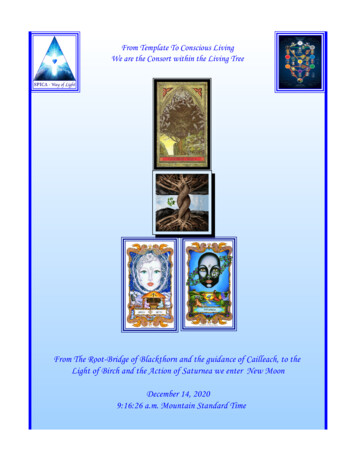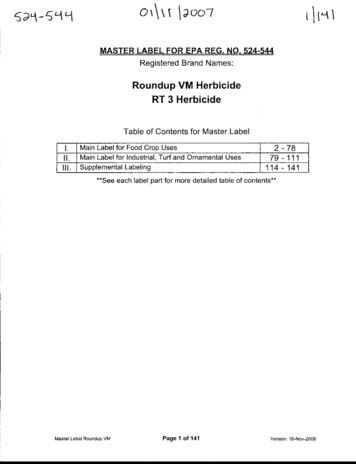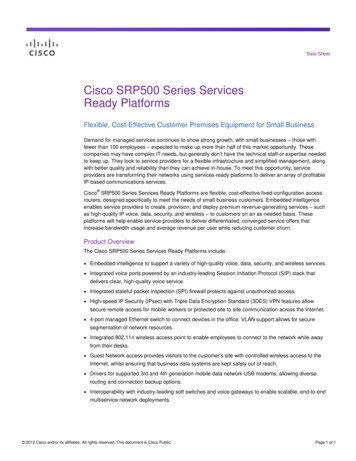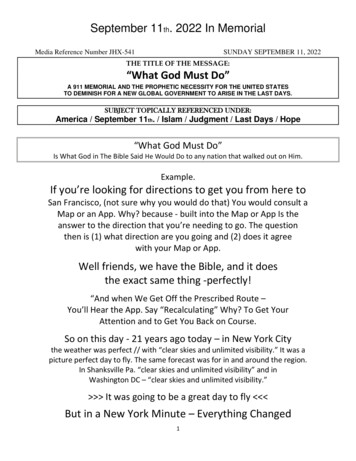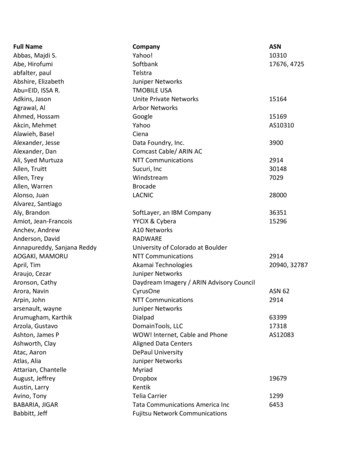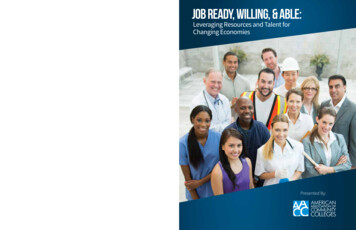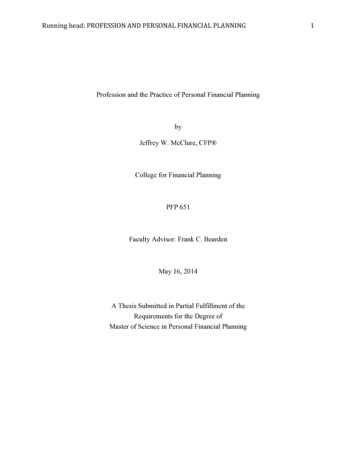
Transcription
A ROUNDTABLE DISCUSSION Lawyers with DisabilitiesHon. Michael RyanBruce GardnerTim Eigo, Editor, ARIZONA ATTORNEYBoard of Governors member Emily JohnstonReady,Willing & AblePracticing law is tough work.Long hours, voluminous files. And don’t forget billing.Do these rigors close law practice doors to anyone who is notfully able to participate? Historically, lawyers with disabilitieshave found those doors shut tight.But, say our roundtable panelists, things have changed—somewhat. More lawyers with disabilities work in private practicethan ever before. And this past year saw the launch of the Bar’sTask Force on Persons With Disabilities in the Legal Profession.Task force survey results and recommendations will comelater. But we invited some lawyers and nonlawyers—with andwithout disabilities—to talk about the challenges of practice.10A R I Z O N A AT T O R N E Y D E C E M B E R 2 0 0 2Bill Scott: I have the honor and privilege of being the moderator ofthis roundtable, and I am really flattered to have this opportunity.Let’s begin by introducing ourselves.Nancy Philippi: I’m with the law firm of Quarles & Brady StreichLang. I do recruiting and lawyer professional development for thefirm, and I do it for all of our offices on a national basis, in Wisconsin,Illinois, Florida and Arizona. I am a nonlawyer, so I’m glad I’m nextto another one, Bill.Hon. Michael Ryan: I’m with the Arizona Supreme Court. Beforethat, I was with the court of appeals for over five years, and I was atrial judge for more than 10 years on the superior court. I am an attorney.
Leslie CohenMODERATED BY BILL SCOTTPHOTOGRAPHS BY MICHAEL MERTZPARTICIPANTSBill ScottPresident, Abilities UNlimited, Inc.Leslie CohenExecutive Director,Arizona Center for Disability LawBruce A. GardnerPinnacle West Capital Corp. Law DepartmentRandall M. HoweOffice of the Attorney GeneralNancy PhilippiAdministrator of Attorney Recruitment andProfessional Development,Quarles & Brady Streich LangHon. Michael D. RyanSupreme Court of ArizonaBill ScottBruce Gardner: I’m an attorney with Pinnacle West CapitalCorporation, the parent company of APS. I’ve been there for 17years, and before that, I was with Streich Lang.Leslie Cohen: I am the director of the Arizona Center for DisabilityLaw, which is a nonprofit public interest law firm dedicated to protection and advocacy for people with disabilities. I’ve been thedirector there for about seven years. Before that, I was a staff attorney at our predecessor organization, and before that I was in privatepractice.Suzanne Scheiner: I’m an associate at Brown & Bain. I do primarily trademark and copyright litigation, as well as complex commercial litigation.Suzanne R. ScheinerBrown & BainRandall Howe: I am the Chief Counsel of the Criminal AppealsSection of the Arizona Attorney General’s Office. I am an attorney.Scott: Welcome. We will be discussing four basic questions. We willdiscuss hiring difficulties for lawyers and law students with disabilities.Number 2, promotion and retention issues once hired. Number 3,reasonable accommodations issues and how you feel about them,what your experiences may have been. Finally, accessibility issues having to do with the physical plant, the actual structural issues that youmay encounter, if any at all.The underlying theme really has to do with your attitudes andyour experiences with respect to other people and how they perceiveD E C E M B E R 2 0 0 2 A R I Z O N A AT T O R N E Y11
A ROUNDTABLE DISCUSSION Lawyers with Disabilitiesyou, or how you perceive yourself in thecontext of acting as an attorney.With that, the first question: hiring difficulties for lawyers and law students with disabilities. What are the opportunities for lawstudents in today’s economy, and in light ofthe Americans With Disabilities Act (ADA)?as the same capabilities as everybody else. Ithink there are still problems, but this is agood time to be entering the work force.Scott: So your saying that’s not just theparty line, that it’s really happening? Lawstudents are finding opportunities?Cohen: I certainly think there are still problems, and we have discussed themat length in [the State Bar TaskForce on Persons With Disabilitiesin the Legal Profession]. But Ithink it’s probably a lot better thanit was 10 or 15 years ago. But westill have a lot of work to do.Howe: I have been working as anattorney since before the ADA, andin one of my interviews for a firm,one of the interviewers asked mehow I would get around my disability in the courtroom. Of courseI was young and stupid, and I didnot know that that was not anappropriate question. I thinklawyers interviewing an attorneytoday would not ask a question likethat.Gardner: I too have been practicing law longer than we have hadthe ADA, and I for one believe thatthere are nearly as many problemscaused by the Americans WithDisabilities Act as solutions provided by the ADA. I think it’s important as an individual to sell yourselfwhen you’re interviewing andtherefore, I think it’s important toanticipate questions and anticipatechance of being hired.Scott: Is that to say that the ADA isn’t really necessary?Gardner: I wouldn’t go so far as to say that,but the ADA and, maybe more specifically,the way it is interpreted and the way it isenforced, creates problems.Scott: Suzanne, on this panel you probablyare the most recent beneficiary of the ADA.What are some of your thoughts?Scheiner: One of the challenges the ADAhas is because it’s an individualistic determination. Often, if a person or a firm is goingto have problems with reasonable accommodations, you kind of want to know. Because,yes, the ADA requires a firm or an employerto give you reasonable accommodations, butin my experience, if you’re going to have toargue with the employer about why you’reentitled to reasonable accommodations, youdon’t want to work there.So the ADA opens the conversation forpeople that did not have opportunitiesbefore, but because the ADA is so individualistic, you still have to be careful and lookfor an environment that is not only accepting of the person with a disability but welcomes him or her.Scott: Justice Ryan, no one is going to talkto your wheelchair; I think that you presenta strong enough stature as a person thatyou’re not going to allow that to happen.What kind of experiences have you hadalong these lines?Ryan: As Bruce and Suzanne touched upon,you have to come across as a person, not asa disabled person. You have the same desires,The challenge for us is to tryto get beyond the assumptions,the stereotypes.—Hon. Michael RyanCohen: I don’t think that there could be abetter time to be a lawyer with a disabilityentering the work force. I think that theADA has had a great effect on our community in general in acknowledging that peoplewith disabilities have the same rights as well12A R I Z O N A AT T O R N E Y D E C E M B E R 2 0 0 2concerns, and, in a natural and logical way,address those issues and concerns, and notrest on the fact that due to the ADA, they’renot allowed to ask those kinds of questions.If they’ve got the questions, they ought tobe answered if you want to have a legitimateneeds and problems they do. You have thesame interests. They make us more than aone- or two-dimensional person. You’ve gotto convey that in conversation.Scott: What should law students know?Scheiner: “Selling yourself” is particularlyW W W. A Z B A R . O R G
A ROUNDTABLE DISCUSSION Lawyers with DisabilitiesTales From the Career TrenchesBY MARY N. BIRMINGHAMI remember 15 years ago when a disabled law student first visited my office for career counseling(at another law school). I was uncomfortable and fearful I would make a mistake, say or do thewrong thing. You see, I was from a generation of lawyers who had never worked or studied witha person in a wheelchair, or a deaf or blind person. But the law student was much more savvythan I, and he immediately put me at ease. We eventually talked about why he was in a wheelchair. He had “brittle bone” disease, and when he was born, virtually every bone in his body wasbroken.When I moved to Tucson in 1995 to join the University of Arizona, I found more disabled students in one class than I had in eight years at my previous school. Typically two to four disabledstudents enroll at the UA each year, and I thought you might be interested in hearing a few oftheir stories.Tom Collins, a 2001 graduate, joined the Army right out of high school. After he finished histour, he was preparing for a career in law enforcement. But while riding as a motorcycle passenger, he was struck by a bus on a residential street. With his top five percent ranking in law schooland membership on law review, he gathered eight interviews with major firms during the fall of hissecond year. Eight interviews—no callbacks.Tom eventually got a job shortly before graduation as a law clerk for Judge Steven C.Villarreal in the Juvenile Division. One of Tom’s classmates—and later wife—Charity Marr, was aballet dancer with the Utah Ballet when a balcony fall changed her life at age 18. She too is ajudicial clerk and is a wheelchair racer.Military casualties also account for some of our student disabilities. Michael Somsan, a May2002 graduate, was blinded in the Gulf War and had a distinguished military career. Michael wasalso in the upper ranks of his class in the fall of his second year, and after several interviews withfirms and agencies, he received one offer with the U.S. Postal Service General Counsel’s Officefor summer work. He graduated with two degrees (J.D. and master’s in public administration),but has yet to find employment. He was sworn into the Arizona Bar in October 2002.Jim Eustace, 1999 graduate, lost the use of his legs while fighting in the Persian Gulf War.Jim, too, had difficulty finding employment after graduation, but through a VA grant that paid hisemployer one half of his salary for a year, he landed a job with a Phoenix firm. Jim has sincereturned to Tucson and is now with the City of Tucson Public Defender’s Office.Others are disabled from birth, like deaf attorney Alan Amann (a 1998 graduate). Alan’s parents were deaf as well, and he attended Gallaudet University for his undergraduate work. I willnever forget preparing for my first meeting with Alan, wondering how will I communicate withhim? Will we write everything down, or will a sign interpreter be coming with him? Alan, ofcourse, read lips perfectly and his speech is nearly as perfect. He is in Phoenix working for theArizona Attorney General’s Office doing criminal appellate work.Since 1995, I have known only two disabled students who found work with a law firm immediately after graduation. It may be a coincidence. It may be the result of the small number of disabled students in law school, both at the UA and nationwide. It may be a result of a lack ofunderstanding that disabled students and lawyers can do the job.Each year 38,000 to 40,000 law students graduate from 184 ABA-accredited law schools.Approximately one percent of that total law student population is disabled. Of all the employmentclassifications reported by Washington, DC-based National Association for Law Placement for theclass of 2001, the category of “disabled graduates” ranked the lowest in percentage employedsix months after graduation. (See “Jobs & J.D.’s: Employment and Salaries of New LawGraduates Class of 2001,” at www.nalp.org).The State Bar Task Force on Persons with Disabilities in the Legal Profession will continue toaddress these issues through surveys and educational programs. We want to provide ways toremove barriers to the hiring process through mentoring, education and other positive programs.In the process, we hope to expand opportunities for hiring and retaining disabled students andattorneys in Arizona, and in the process serve as a model for the country. We need your help,however. Anyone wishing to volunteer with this project should contact me or the co-chairs of theTask Force—Justice Michael D. Ryan and Sally Simmons, Esq., of Brown & Bain in Tucson.Mary N. Birmingham is the Assistant Dean for Career Services at the University of Arizona JamesE. Rogers College of Law.This was originally published in The Writ. Pima County Bar Association. Reprinted with permission.14A R I Z O N A AT T O R N E Y D E C E M B E R 2 0 0 2
important for disabled law students to develop interviewing skills and how to put theother person at ease with the fact that youhave a disability.I have been disabled all my life, and oneof the things that struck me is that when youmeet people who are not disabled, often youare the first person they have ever met witha disability. So one of the functions that fallsto you is to make the person comfortablewith you as a person, and make them talk toyou and not to your wheelchair or otherdevice you use. So often, there is nothing incareer development offices to help peopledevelop social skills to make them comfortable enough with themselves so that theycan pass that comfort on to other people.Ryan: I think Suzanne’s got a great point:Students should have to be educated orlearn or be exposed to how to sell themselves, because even though there may bethis ADA law out there that says employersshouldn’t ask certain questions or whatever,they do have the right to ask what kind ofreasonable accommodations you need.You’ve got to approach that in an informative way, not in a negative way with anemployer; otherwise, they’re going to seethis as a constant confrontation.Bottom line, it comes down to the individual’s attitude toward their particular condition, how they handle it. You can handle itwith some grace; you can handle it withsome humor. People that are not disabledfeel a little more comfortable if you feelcomfortable about laughing or smiling atsome of the problems you face, and just notmake a big issue out of it.Scheiner: When I counsel people who aretrying to decide whether to be lawyers, Iencourage them to do something in yourown life where you’re not beating your headagainst the wall every day. Because althoughI believe that disabled people should havethe same choices as able-bodied people, Ithink everyone has to make a choice in theirlife: Where are they going to be most comfortable and less aggravated on a daily basis?Philippi: I think people who have disabilities have overcome so many things.Probably you’ve had to advocate for yourselffor a long period of time, which is something that a person without a disability mayW W W. A Z B A R . O R GD E C E M B E R 2 0 0 2 A R I Z O N A AT T O R N E Y15
A ROUNDTABLE DISCUSSION Lawyers with Disabilitiesnot have had much practice in. The peopleinterviewing on campus are lawyers, they’renot HR directors; they’re not people whointerview every day; they’re not personnelspecialists.Of course, they’re smart people, and youwould hope that they’ve read about questions that can and cannot be asked. Butthey’re probably not as comfortable in somesituations as a professional HR person wouldbe in terms of talking to a variety of peoplefrom different backgrounds, different disabilities, different cultures.We try to do training workshops for thelawyers, and there are wonderful materials;the law schools have these. They’re providedby the National Association for LawPlacement, Interviewing Tips for LawStudents With Disabilities. We require ouron-campus interviewers to read these booklets before they go on campus. You don’tknow if you’re going to interview someonewith a disability or not. It talks to them a lotabout making assumptions, about the essential job function, about questions they canask so the student understands and weunderstand if there is a fit.You can bet anyone interviewing you isgoing to make assumptions about what youcan and can’t do, if you don’t tell them or ifthat doesn’t come out in the interview.That’s just human nature. And the less training they’ve had, the more they’re going tomake assumptions.Gardner: On attitudes and assumptions,there are two things I want to say. I prefacethese comments by saying that I cannot anddo not speak on behalf of individuals withother disabilities; I’m blind, and I knowblindness. I’ve been on the national board ofthe National Federation of the Blind for anumber of years and have been the presidentof the National Federation here in Arizona.And I almost said that I’ve been blind all mylife, but, hopefully, not yet.From my blindness perspective, I believethat the problem of blindness is not the lackof eyesight. It’s not the inability to see,because given opportunity and training, anindividual can acquire alternative techniquesfor doing what he or she would have done.The real problem with blindness is society’s16A R I Z O N A AT T O R N E Y D E C E M B E R 2 0 0 2RandallHoweNancyPhilippiYou canbet anyoneinterviewing youis going to makeassumptionsabout what youcan and can’t do.—Nancy Philippiattitudes about blindness. Because blindpeople are part of sighted society, we oftenassimilate the same attitudes, the same neg-Suzanne Scheinerative assumptions about the ability to do orto not do. In reality, most occupations don’trequire the ability to see, they require theW W W. A Z B A R . O R G
A ROUNDTABLE DISCUSSIONability to acquire and utilize information.That’s certainly the case in the practice oflaw. Each of us has a package of characteristics; the disability that we have is simply oneof many characteristics. If we recognize thatthe lack of eyesight is not the problem, thenprogress can be made.If you can’t fix your eyes so that you’renot blind anymore, it’s nice to know there’ssomething else you can fix and still be verysuccessful—and that’s your attitude.For a blind person to be successful, Ibelieve it takes three things. First, the blindperson needs to understand and believe deepdown in his heart of hearts that he can besuccessful. Secondly, the blind individualneeds to develop some of the skills of independence—Braille, cane travel, other alternative techniques. Thirdly, the individualneeds to get to the point where they’re atpeace with their blindness. They need torecognize that society generally has verynegative notions about what blind peoplecan do. When someone tries to help youacross the street when you are perfectly capable of going by yourself, you shouldn’t getall bent out of shape about it. If you’ve gotthose three things, I think you will be successful.Ryan: If I were an employer faced withsomeone that came in and needed accommodations and they were going to be flexible, willing to work with the employer, andalso had a sense of humor about it and knowthat everything can’t be perfect, that they’repatient, I think you’re going to have a betterrelationship.I don’t know if it’s something that can belearned or cultivated; maybe all of us justhave it naturally. These are important qualities.Maybe we’ve got tougher physical obstacles than a lot of people, but the same thingsthat make people that are not disabled successful, a lot of those same traits are necessary for people that are disabled. And I don’tthink we can rely on—excuse the pun—thecrutch of the ADA to take care of all thoseproblems. There’s a lot we have to do on ourown.Scott: But do other people’s assumptionsadd to the challenge?18A R I Z O N A AT T O R N E Y D E C E M B E R 2 0 0 2W W W. A Z B A R . O R G
Lawyers with DisabilitiesRyan: I’m in a wheelchair, and I was toldcoming out of law school that I would notbe able to try cases in the courtroom and beeffective. My first full-time job was tryingcases at the county attorney’s office. Itturned out I was very successful.In some ways, I was able to use my disability to my advantage in front of juries. Aswas pointed out, they don’t often see peoplewith a disability and they often have neverseen a lawyer with a disability in a courtroom. So they’re fascinated, and they’rewatching you. They’re paying attention toyou and they’re not paying attention to youropponent—which I took advantage of. Itturned out that the so-called assumptionthat I wouldn’t be very good was an advantage for me.Scott: Leslie, you interact with many peoplewith disabilities and as an executive director,you supervise some of those people. Do youfind expectations or assumptions in regard topromotions or other issues?Cohen: We try to treat everybody thesame—people with disabilities, people without disabilities. We have job descriptions andperformance measures. What we find is, person to person, there isn’t a difference.People in our employ with disabilities don’tseem to use sick leave any more than peoplewho don’t have disabilities. Some peoplewith disabilities want to work 9 to 5, theydon’t want extra responsibilities, but somepeople who have young children or are caring for an elderly parent want that type ofschedule, too.About a quarter to a third of our lawyershave disabilities. Probably about a quarter ofour nonattorney paralegal advocates havedisabilities. I couldn’t tell you that I couldpoint out some difference between them interms of the job.Scott: Suzanne, I’m sure you’ve had experiences with being treated as an equal or beingtreated the same as others.Scheiner: I was fortunate growing up; I hadtwo able-bodied sisters that were only a yearand two years ahead of me. When my parents were raising me, they said that theywanted for me exactly what they wanted formy siblings. I grew up always thinking thatmy parents believed that I could be exactlyW W W. A Z B A R . O R GD E C E M B E R 2 0 0 2 A R I Z O N A AT T O R N E Y19
A ROUNDTABLE DISCUSSION Lawyers with Disabilitieswhat I am today. As I grew up, I realizedthat all they wanted was for me to have achance at a normal life, with my own apartment doing something of merit. They actually didn’t think that at the end of the day Iwould be the one of their children to graduate from Yale Law School.When I was clerking on the district courtand started doing more things for myself, Ihad to get up at 5 in the morning to getready. Five, six, seven years later, I don’thave to get up at 5 anymore. But it’s thatpart of your life that your employer neversees, because I’ve tried to make it so theemployer only sees the accommodations Ineed to be successful.Scott: On a scale of 1 to 10, how importantare attitudes as an important matter, boththose of the person with disabilities andthose of the non-disabled populationaround us?Howe: 10. Attitudes are everything. If wechange attitudes, barriers would fall by thewayside.You can’t have any law that will changepeople’s attitudes and their questions. Soit’s up to us on an individual basis to liveand work in such a way that we can changethose attitudes. Perception plays an important part.When I was hired by a law firm out oflaw school, the firm really liked my work,but they wanted me to do banking law,which is possibly the most boring part of thelaw that there could be. They told me thatthey didn’t see me as a lawyer in the courtroom, even though I was good at thosekinds of things. It was only after I left private practice and came to the AG’s officewhere I had more freedom to do work inthe courtroom. In the last 10 years, I’veargued more than 40 times in the appellatecourts. And I really like the fact that I dosomething that lawyers thought that I wasincapable of doing.The main things we have to deal with areattitudes and perceptions.Gardner: Sometimes we tend to overstatethe point. I think it was Henry Ford whosaid, “If you think you can or you can’t,you’re right.” But we don’t want to giveothers the impression that if we have a20A R I Z O N A AT T O R N E Y D E C E M B E R 2 0 0 2Pollyanna positive attitude, we can do anything. Because we still need to recognizethat we have a package of characteristics thatmake up what we are. For example, it doesn’t matter how positive your attitude is ifyou’re 6 foot 8 and weigh 280 pounds, youprobably are not going to be a very successful horse jockey.But if we have a positive attitude, we canfigure out alternative techniques for doingthe job. That positive attitude is what iscritical.Scott: But can lawyer applicants or law students with disabilities be perceived as otherthan positive? Might that be likely to occurin a younger person who has a disabilitywith which they are not at all pleased?Gardner: You’re absolutely right. I see it allthe time with blind people. Most peoplewho become blind begin to deal with theirblindness with fear and insecurity, and thenhopefully move into a phase of rebelliousindependence. If you can get through that,you can get to normal independence, andsay, “I’m blind, but I’m OK. I’m in awheelchair, but I’m all right.”Scheiner: While it’s important to havesome level of acceptance of one’s disability,there’s something to be said for alwayswanting more. You have to keep pushingthe envelope.Although it’s truly important for thedisabled person to have a good attitude,from a hiring and retention perspective, theissue of attitude is far more on the ablebodied person, because if you’ve gotten tothe point where you’re a lawyer, your attitude is pretty good. You’ve gotten yourselfto where no one thought you’d ever go.If we accomplish nothing else but toshow able-bodied people that we’re justpeople who happen to have disabilities,then the whole afternoon would be worthit to me.Scott: Justice Ryan, how do you think others see you, and how do you deal with that?Ryan: Everyone’s first impression is whatwe see. The challenge for us is to try to getbeyond the assumptions, the stereotypes.Howe: When people first meet me, someassume that I do ADA-type of law or that Ido civil rights law, and they’re quite sur-prised that I’m a prosecutor. The work thatI do as a lawyer has absolutely nothing todo with my disability.Ryan: There is a view of judges as being anolder gentleman with a lot of white hair,someone from central casting. That isn’tthe way it is. If you look at judges now,they’re from all races, there are women.Many have a perception of what lawyerslook like. But not all lawyers are like that.You want a lawyer who is smart, who cancommunicate, who can do the job. It doesn’t matter what they look like.Cohen: When you do hiring, you tend tonaturally gravitate toward people who arelike you. That’s everybody’s natural tendency. In general, the person doing the hiring is not going to be a person with a disability. And their first thought may bethey’re more comfortable with the applicant who is more similar to who they are. Ifyou don’t do this in a mindful, thoughtfulway, you can sometimes exclude peoplewho are different.Philippi: As employers, we have a duty todo our very best job to educate and trainpeople, to do different things to help people really ask meaningful questions, evaluate the candidates’ answers, and try to basetheir decision on whether to bring them tothe office on some hard information, notjust on a gut instinct.Scott: Realistically, though, how much of itis based on a gut decision?Philippi: That’s going to vary person toperson. We need exposure to people so thatthe differences are gone. The differencesseem to matter a whole lot in the first threeminutes; the longer you’re with someone,the less you focus on the differences.Ryan: We’ve all got to realize that there’sthis initial reaction, and we’ve got to acceptthat and deal with that and understandthat’s how people react to other people initially. You’ve got to try to let your personality come through at some point.Scheiner: People see people by their mostprominent characteristic, which usually fora disabled person is their disability. You’renever going to make a person not see youas someone who has a disability.Ryan: There are going to be people whoW W W. A Z B A R . O R G
come up and want to help you. For myself,I’m very used to being as independent aspossible—crossing streets, getting out ofcars, traveling by myself. You always havepeople coming up to help you. If you reactnegatively, they’re going to go away thinking that everyone in a wheelchair has got anattitude. You’ve got to work against thatand just say, “Thanks for your help, [but nothanks].” Or sometimes accept it, becausethey learn; you can say, “OK, I need a littlebit of help here, but most of the time I cando it myself.” Make them feel comfortable.Don’t abuse them or be rude to them. Lookat it as a learning process for them.Scott: Let’s discuss some of the structuralissues that face people with disabilities.Scheiner: Attitude cannot be separatedfrom infrastructure. You need them both.Scott: What are some of the reasonableaccommodations you need to get the jobdone?Howe: Very often it’s the small things thatcount as far as the physical plant.Philippi: Most accommodations are notexpensive at all. That’s information thatmore employers need.Cohen: I agree. Accommodations neitherneed to be terribly expensive or very difficult to do.Scheiner: The biggest thing is to find agood support staff relationship, because insome ways you need more than a secretary.For most law firms or employers, it’s “Howdo we anticipate what it is the person mightneed as a practicing lawyer?” Because thenature of law is you don’t often expect whathappens next.Cohen: Reasonable accommodations are insome ways easier than one might think andin some ways harder. It has to be an interactive process between an employer and anemployee. Particularly when you hire newerattorneys, my experience has been theydon’t want to be any trouble, they just wantto do their job, and they don’t want tostand out or cause problems.Sometimes it only means putting blocksunder a desk to be the right height, sometimes it means moving around secretarialduties so someone gets the help they need.You have to be flexible and creative.W W W. A Z B A R . O R GD E C E M B E R 2 0 0 2 A R I Z O N A AT T O R N E Y21
Illinois, Florida and Arizona. I am a nonlawyer, so I'm glad I'm next to another one, Bill. Hon. Michael Ryan: I'm with the Arizona Supreme Court. Before that, I was with the court of appeals for over five years, and I was a trial judge for more than 10 years on the superior court. I am an attor-ney. Ready,Willing & Able Practicing law is .
